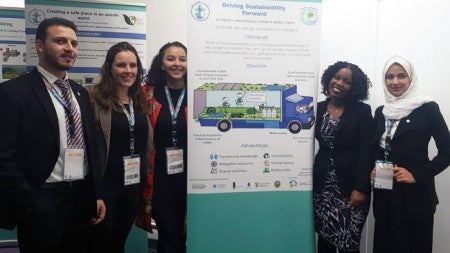 شباب فلسطيني في فعالية تحدي الإبداع للمياه في رام الله، أبريل/نيسان 2019.
شباب فلسطيني في فعالية تحدي الإبداع للمياه في رام الله، أبريل/نيسان 2019.
In November 2019, my 17-year-old niece, Mayar, a Palestinian student in her last year of high school, learned about her acceptance into a highly competitive, international gap year program. A few months later, as countries began to cancel travel to control the spread of the COVID-19 virus, her plans became uncertain.
This didn’t stop her from searching for other opportunities, even if she had to do so remotely. By early September 2020, and despite all the travel complications, she flew to Greece where she was admitted to start her undergraduate studies. At the time of writing this blog, she is still completing her 14 days of self-quarantine before she joins other students in person.
Mayar’s story, like that of so many of her peers, highlights the layered challenges youth are facing during the pandemic: the uncertainties of their future amplified by the unknowns of the coronavirus pandemic.
Nonetheless, an opportunity was emerging: How can governments tap into the potential of young people during times of crisis?
During the pandemic, Palestinian Prime Minister Mohammad Shtayyeh encouraged young people to stay home, but also invited them to send in new ideas that could help the government address the situation. The importance of youth participation in the decision-making process is something that the World Bank Group champions, especially within its strategy for MENA where the region’s young women and men present a great opportunity to support the development of their countries.
Youth and the Water Sector
In the Palestinian territories, where more than half of the population is under the age of 30, involving youth is seen as essential to creating sustainable, inclusive growth. As part of a regional initiative, with funds from the Norwegian Trust Fund, the World Bank launched a pilot program to support Palestinian government agencies to institutionalize youth engagement in relevant sectors. One of the most advanced initiatives was to support the Palestinian Water Authority in establishing a water sector Youth Committee of 18 young professionals who would volunteer to be part of the sector’s development.
One of the milestones of the Youth Committee’s involvement was their support in organizing a Water Innovation Challenge, the first of its kind in the Palestinian water sector. It took place in Ramallah in April 2019, with youth from Gaza connected remotely, unifying hundreds of young men and women who had one thing in common: their creativity and desire to take part in their country's development.
Watch the video documenting the event.
Amsterdam’s International Water Week and won third place in the
Wet-Skills competition.
In recognition of the event’s success, Minister Mazen Ghunaim, Head of the Palestinian Water Authority, requested a larger forum next year, telling its young participants, "You are the future of this country." In addition, the Prime Minister’s Office had invited members of the Youth Committee to participate in the consultations for the 2020 Palestinian National Development Agenda. Outside of the West Bank and Gaza, representatives from the water committee were invited to participate to share their experience in a MENA regional workshop on Energy, Climate Change and Citizen Engagement, which took place early this year in Jordan. In addition, they were invited to participate in several international workshops including in the Amsterdam’s International Water Week.
Water Youth Committee — a Solution During COVID-19
More recently, the new patterns of staying-at-home and the constant hand washing have increased water consumption by up to 15% in some communities in the West Bank and Gaza. The Palestinian Water Authority now needed a unified platform to increase public awareness of water consumption and how best to manage it.
At first, the Youth Committee involvement during COVID-19 seemed as uncertain as Mayar’s gap year program. However, after several lockdown-Zoom meetings, and with support from the Bank’s team, the Committee proposed designing a smart mobile water application, "PalWater App," to provide a platform for customers and service providers to communicate.
A key feature of this application will be an alarm reporting system that can upload live images and their locations to help citizens notify local authorities of real-time issues like leaking wastewater pipelines. This smart solution will also be relevant in the aftermath of the pandemic as well.
Mainstreaming Youth in Governance — a Win-Win Situation
While we adapt to our new realities, we need to think creatively and collectively. Youth are an integral part of this process. This experience of how a government can harness the ingenuity of youth during a crisis and beyond is relevant not only to the water sector but could be replicated in other sectors and other countries. The water sector initiative is already being replicated with the Palestinian Ministry of Social Development to establish more youth committees at the local level. In the water program, this pilot has now been expanded to support the Palestinian Water Authority in institutionalizing youth involvement as part of larger citizen engagement efforts. During this pandemic, youth have shown that, once again, they are up to meeting a new challenge, if given the opportunity to do so.



Join the Conversation